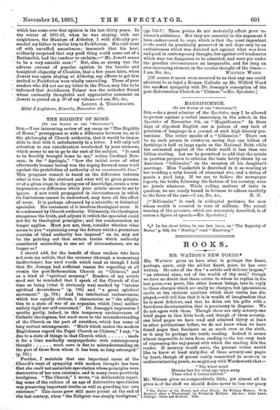THE RIGIDITY OF ROME.
[TO THE t DITOR OF THE "SPECTATOR."] • 'SIR,—Your interesting review of my essay on "The Rigidity of Rome," presupposes so wide a difference between us, as to the philosophy of Church authority, that it would be impos- sible to deal with it satisfactorily in a letter. I will only call attention to one consideration overlooked by your reviewer, -which seems to me to go to the root of the subject. "It used to be forcibly brought home to me," writes Cardinal New- man, in the "Apologia" "how the initial error of what afterwards became heresy was the urging forward some truth -against the prohibition of authority at an unseasonable time." This pregnant remark is based on the difference between what is true in the abstract and what will to given persons, -or at a given stage in the progress of knowledge, create a true impression,—a difference which your article seems to me to ignore. A new truth propagated in Circumstances in which its limitations cannot be understood, may have all the effect -of error. It is perhaps advanced by a scientific or historical specialist. His statement of it involves theological error. It is condemned by Church authority. Ultimately, the theologian /*cognises the truth, and adjusts it (which the specialist could mot do) to theological principles; and the condemnation no longer applies. Must you not, then, consider whether what seems to you "explaining away the fetters which a premature -exercise of blind authority has imposed" on us, may not be the pointing out that certain truths which authority ,considered misleading in one set of circumstances, are no longer so ?
I should add, for the benefit of those readers who have not seen my article, that the reviewer (through a momentary inadvertence) has used words which read as though I held that Dr. Jessopp had sufficient reason for regarding at all events the post-Reformation Church as "Chinese," and as a kind of "spiritual mummy." Readers of my article awed not be reminded that I speak of the Church of that time as being (what it obviously was) marked by "intense spiritual devotedness" (p. 796) and "a great spiritual movement." (p. 794.) And the intellectual exclusiveness, which was equally obvious, I characterise as "the adapta- tion to a state of war of an organism which [was] neither unduly rigid nor self-contained." Dr. Jessopp's impression I s ascribe partly, indeed, to this temporary exclusiveness of 'Catholic theologians, but much more to the misunderstanding of the Church on the part of outsiders, which has come of long mutual estrangement. "Much which makes the modern Englishman regard the Papal Church as Chinese," I say, "is
, ,due to a state of things in that Church which made it for a time markedly unsympathetic with contemporary
thought much more is due to misunderstanding on the part of those from whom it has been so long estranged." (p. 791.) ' Further, I maintain that one important cause of the Church's want of sympathy with modern thought has been that she could not assimilate speculation whose principles were .destructive of her own existence, and in many cases positively irreligious. "The Church," I wrote, "in deliberately reject- ing some of the culture of an age of destructive speculation was preserving important truths as well as guarding her own .existence." This cause grew still more potent at the end of the last century, when "the Zeitgeist was simply irreligious." (pp. 796-7.) These points do not materially affect your re- viewer's criticisms. But they are essential to the argument I have endeavoured to urge, which is that the most important truths could be practically preserved in evil days only by an exclusiveness which was directed not against what was true and good in contemporary thought, but against evil tendencies which were too dangerous to be admitted, and were yet under the peculiar circumstances an inseparable, and for long an ever-increasing element, in the secular thought of the times.— [Of course it never even occurred to us that any one could attribute to so loyal a Roman Catholic as Mr. Wilfrid Ward the smallest sympathy with Dr. Jessopp's conception of the post-Reformation Church as "Chinese."—En. Spectator.]


















































 Previous page
Previous page